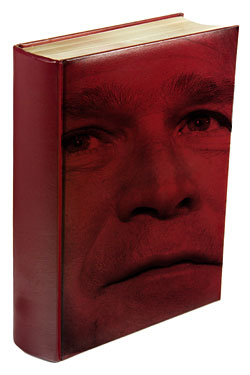
When George W. Bush goes on NBC this week, first for a prime-time special, then for the Today show (with an Oprah appearance sandwiched in between), watch how much he and Matt Lauer talk about the former president’s new book, Decision Points. Or rather how much they don’t. Like all presidential memoirs, it will become the excuse for the start of another campaign, this time for history.
What it won’t be is a tour for the book itself, which won’t be read much. As Michael Korda, who edited Ronald Reagan’s An American Life, puts it: “The presidential memoir is a piece of furniture.”
Certainly, presidents have been at this for years. (Personal Memoirs of Ulysses S. Grant was hawked by ex–Union soldiers in uniform.) But the modern presidential memoir—the blockbuster book assembled with lots of help and lots of hype—came of age alongside TV. Harry Truman hoped his memoir would provide a rich historical resource and correct the many misperceptions about his presidency. But Truman knew his second goal didn’t require people to read it. When he announced his book deal in 1953, Truman made sure to prepare a statement for the cameras. Upon publication, he became the first president to do a book signing, sitting in front of six American flags and under the glare of floodlights—again to create a patriotic panorama.
Dwight D. Eisenhower took things a step further, selling the rights for an exclusive interview about his presidency to CBS, in what came to be known as selling one’s “electronic memoirs.” Lyndon B. Johnson, Richard Nixon (famously, with David Frost), and Gerald Ford all signed up for electronic memoirs, in addition to writing books. Ford ended up asking NBC to rework the first of his five specials after he decided he shouldn’t talk about his Nixon pardon until after he’d published his book.
When An American Life came out, in 1990, Reagan appeared on 20/20, a PBS special with William F. Buckley Jr., and Good Morning America—for five days in a row. In 2004, the coverage of Bill Clinton’s much-delayed memoir (to keep him on task, his editor took to staying overnight at his Chappaqua home) got so thick that John Kerry’s team worried it would upstage the Democratic National Convention. My Life dropped one month before the convention, but in that month, Clinton did 60 Minutes, Good Morning America, and Larry King Live, among other shows, generating enough industry buzz to get his book compared to Harry Potter.
Of course, people actually read the Harry Potter books—and will, it’s safe to say, continue to read them. The authors and publishers of presidential memoirs like to repeat Truman’s first goal of contributing to history, but their books never make more than an immediate impact. (They also often lose money for the publisher.) Yet with the right media rollout, they can still shape and, if need be, rehabilitate reputations.
And Bush’s timing couldn’t be better. We’ve got all this empty post-election airspace, and something has to fill it. Bush’s book will provide a platform for reassessing his actions and ideas—and that’s even more true given what the book’s publisher, Crown, is describing as a “groundbreaking” structure that analyzes and contextualizes the key decisions of his presidency, many of which remain live legislative issues.
Seen in this light, Decision Points starts to sound a lot like talking points. But that’s only one example of a carefully choreographed plan that smartly prioritizes the coverage over the book. Last month, Lauer said he’d lobbied Bush’s people “for the better part of a year,” which means he spent nearly as much time getting the author interview as Bush spent writing the book.
Have good intel? Send tips to [email protected].